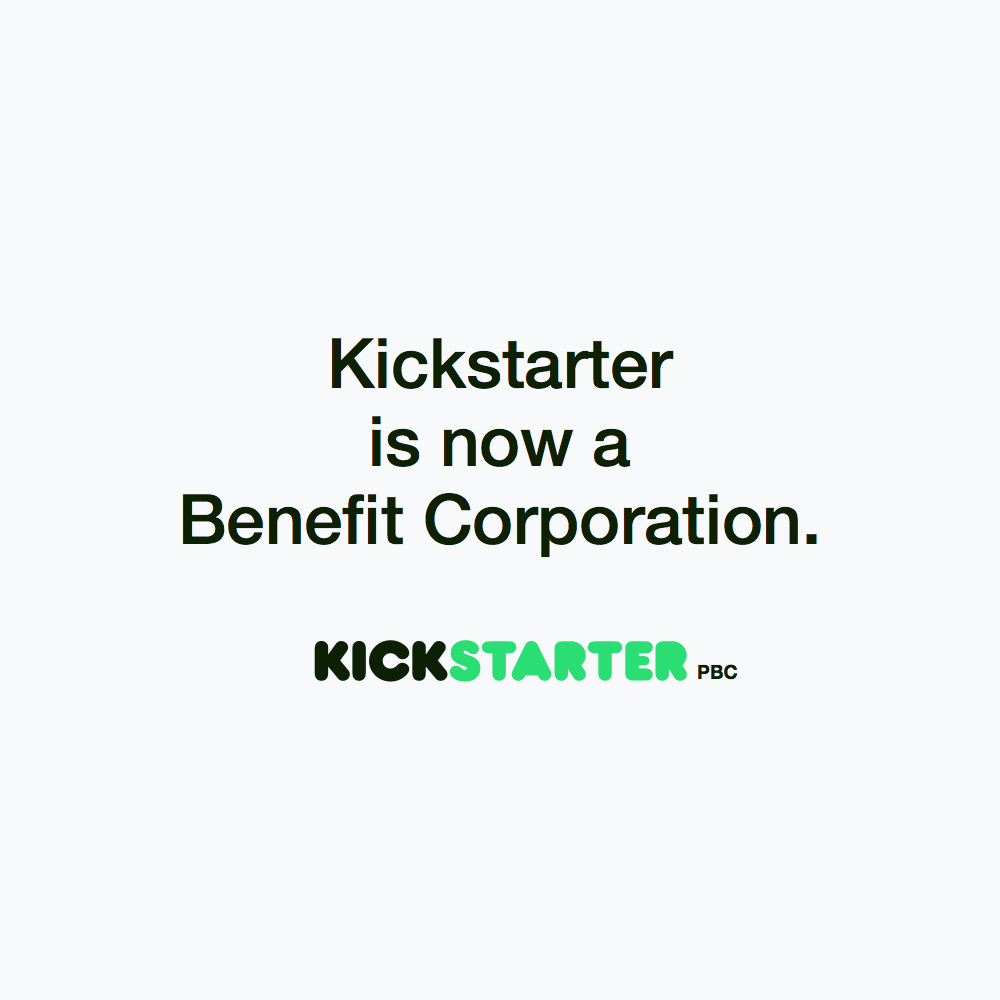This week, Kickstarter announced their reincorporation as a benefit corporation. They’re not a non-profit, but this is still a significant move for the company. A key part of their new charter is a pledge to contribute 5% of their profits to charity. There’s a certain symmetry to that: Kickstarter users pay 5% of their revenue to support the platform, and Kickstarter itself is paying 5% of their profit to support the society in which we live. (It would have been even more symmetrical as 5% of revenue instead of profit, but also much larger.)
The 5% pledge is broken down into to two parts. Half is pledged to arts and music education, largely in NYC, and half will go to anti-oppression groups fighting sexism, racism, homophobia, transphobia, etc. Here’s the relevant language governing those pledges, taken from their new charter:
3 Kickstarter supports a more creative and equitable world
Kickstarter will annually donate 5% of its after-tax profit towards arts and music education, and to organizations fighting to end systemic inequality as further defined in sections 4(c) and 5(c) below (the “5% pledge”).4 Kickstarter is committed to the arts
4(c) Half of Kickstarter’s 5% pledge will be devoted to arts and music programs for children and young adults, with a primary focus on underserved communities in New York City. Funds will be distributed to 501(c)(3) organizations, public schools, or via programs developed by Kickstarter.5 Kickstarter is committed to fighting inequality
5(c) Half of Kickstarter’s 5% pledge will be devoted to organizations addressing systemic inequality. Kickstarter will primarily focus such contributions on 501(c)(3) organizations fighting to end prejudices against and increase opportunities for people of color, women, and LGBTQ individuals.
My big question for Kickstarter is how they’re going to run the new philanthropy within the framework they’ve laid out. There’s some very interesting energy in philanthropy right now around innovative technology, transparency, and using grantmaking to advocate for the interests of the grantees. I’m particularly proud of the work we’ve done at New Music USA along these lines. It’s not an exaggeration to say that the interest we’re seeing now in innovation in philanthropic platforms is driven by Kickstarter’s success.
Re-structuring New Music USA’s grant applications to be public-facing project pages was much easier because we had Kickstarter as a model. Our community already knew what a ‘project page’ looked like, and Kickstarter users had developed a way of talking to their audiences about their financial needs and their art at the same time. When we asked our applicants to speak simultaneously to their audiences and to our panelists, they knew what we were asking. It’s not just New Music USA either; there have been a lot of interesting experiments across philanthropy driven by Kickstarter’s model, from what became Hatchfund to the Knight News Challenge.
My question about Kickstarter’s 5% pledge is this: what will Kickstarter’s own philanthropy learn from Kickstarter? There’s a huge potential for Kickstarter to do something truly extraordinary, and something that could have an impact across the philanthropic sector. It might be tempting – and would definitely be easy – to have an opaque, private process. Kickstarter could quietly approach a few organizations they already know, make long-term commitments to them, and never disclose their process.
Indeed, a lot of philanthropy functions just this way, and then transfers a burden of publicity onto the grantee, requiring logos and acknowledgement, etc. It’s easiest to do it this way for a funder. But it’s not the fairest, it’s not the most transparent, and it’s certainly not leveraging the grantmaking process to advocate for a cause.
There are a few organizations making new tools for grantmaking, but not many. And right now there is a growing desire to engage people more directly in charitable work and funding decisions, particularly for corporations to engage their employees more actively.
Kickstarter is uniquely positioned to build something amazing in this space. They can make their philanthropy transparent, accountable, and engaging to their own employees and to people interested in the causes Kickstarter supports. It could be amazing.
It wouldn’t be easy. There are a ton of unsolved problems in the design of something like this. Open applications can be fair, but if the application is time consuming it can be an unfair drain on organizations to apply. Peer panels and review criteria can help with fairness, but who should sit on the panel? Project funding creates more engaging content, but unrestricted, long-term support is far more beneficial to most organizations. And organizations in different sectors have different needs when it comes to community outreach and transparency, especially schools, or organizations handling sensitive issues like prejudice in the workplace.
But if Kickstarter does take on these challenges, and does build something that helps to both distribute money and advocate for causes, then I fully expect that it would create a model worthy of study and replication.
